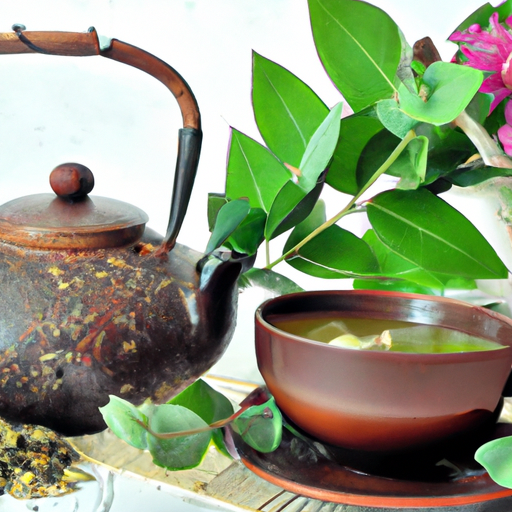Have you ever dealt with a stubborn chest infection that just won’t seem to go away? It can be incredibly frustrating and uncomfortable, but luckily there are natural remedies that can help. In this article, we’ll discuss some effective ways to treat a chest infection without relying solely on antibiotics. Whether it’s a lingering cough, congestion, or difficulty breathing, we’ve got you covered.
One of the most important things to remember when dealing with a chest infection is to give your body the tools it needs to heal itself. This means supporting your immune system with healthy foods and plenty of rest. Additionally, certain herbs and supplements can have a powerful impact on relieving symptoms and fighting off the infection. We’ll delve into some of these natural remedies and explain how they work to provide relief. So, if you’re tired of relying on antibiotics for every little infection, stay tuned for more information on how you can naturally heal your chest infection.
What is a chest infection?
A chest infection, also known as a respiratory tract infection, is an infection that affects the lungs or airways. It can be caused by various types of bacteria or viruses and can range from mild to severe. Chest infections can affect people of all ages, but they are more common in young children and older adults. In this article, we will explore the definition, common causes, symptoms, types, and natural remedies for chest infections.
Definition of a chest infection
A chest infection is an infection that occurs in the lungs, airways, or the lining of the chest cavity. It can affect different parts of the respiratory system, including the trachea, bronchi, and the lung tissue itself. Chest infections can be caused by viruses, bacteria, or even fungi. They can result in various symptoms and complications, and may require medical intervention to treat them effectively.
Common causes of chest infections
Chest infections can be caused by different pathogens, depending on the type of infection. The most common causes include:
-
Viral infections: Viruses such as the common cold virus, influenza virus, or respiratory syncytial virus (RSV) are common causes of chest infections. These viruses can easily spread from person to person through respiratory droplets and can lead to inflammation and infection in the airways.
-
Bacterial infections: Bacteria such as Streptococcus pneumoniae, Haemophilus influenzae, or Staphylococcus aureus can cause bacterial chest infections. These bacteria can enter the lungs or airways and multiply, leading to inflammation and infection.
-
Fungal infections: Fungal chest infections are less common but can occur in individuals with weakened immune systems or certain underlying conditions. Fungal spores can be inhaled and cause an infection in the lungs.
-
Environmental factors: Exposure to pollutants, irritants, or allergens in the environment, such as cigarette smoke, dust, or chemicals, can also contribute to the development of chest infections.
Symptoms of a chest infection
Chest infections can present with a variety of symptoms, which can range from mild to severe. The most common symptoms include:
Cough
A persistent cough is one of the hallmark symptoms of a chest infection. It can be dry or productive, meaning it produces mucus or phlegm. The cough may be accompanied by wheezing or chest congestion.
Shortness of breath
Difficulty breathing or shortness of breath may occur due to inflammation and infection in the airways. This symptom can range from mild to severe, depending on the severity of the infection.
Chest pain
Chest pain or discomfort can occur due to the inflammation and irritation of the lungs or airways. It may be sharp or dull and can worsen with deep breathing or coughing.
It is essential to seek medical attention if you experience severe symptoms or if your symptoms worsen over time. Your healthcare provider will be able to diagnose the specific type of chest infection and recommend appropriate treatment.
Types of chest infections
There are several types of chest infections, each caused by different pathogens and presenting with varying symptoms. The most common types include:
Bronchitis
Bronchitis is an inflammation of the bronchial tubes, which are the airways that carry air to the lungs. It can be acute or chronic, with acute bronchitis typically caused by viral infections and chronic bronchitis often associated with smoking or exposure to irritants.
Pneumonia
Pneumonia is an infection that affects the small air sacs in the lungs, causing them to fill with fluid or pus. It can be caused by bacteria, viruses, or fungi and can range from mild to severe. Pneumonia is a potentially serious condition, especially in young children, older adults, and individuals with weakened immune systems.
Bronchiolitis
Bronchiolitis is a viral infection that primarily affects infants and young children. It causes inflammation and mucus buildup in the smallest airways of the lungs, making it difficult for the child to breathe. Bronchiolitis is most commonly caused by the respiratory syncytial virus (RSV).
The importance of natural remedies
While medical intervention is often necessary to treat chest infections, natural remedies can play a significant role in alleviating symptoms and speeding up the recovery process. Natural remedies can be used alongside conventional treatments, but it is essential to consult with a healthcare professional before starting any new remedies or treatments.
Benefits of natural remedies
Natural remedies for chest infections can offer several benefits, including:
-
Symptom relief: Many natural remedies can help relieve symptoms such as coughing, congestion, and chest pain. For example, herbal teas and steam inhalation can soothe the airways and reduce inflammation.
-
Strengthening the immune system: Natural remedies can help boost the immune system, which is crucial for fighting off infections. Certain herbs and supplements have immune-boosting properties and can support the body’s natural defense mechanisms.
Reducing antibiotic resistance
Another important benefit of using natural remedies for chest infections is the potential to reduce antibiotic resistance. Overuse and misuse of antibiotics have contributed to the emergence of antibiotic-resistant bacteria, which can make infections harder to treat. By utilizing natural remedies as a first line of defense or alongside antibiotics, we can help reduce the reliance on antibiotics and minimize the risk of resistance.
Herbal remedies for chest infections
Herbal remedies have been used for centuries to treat various ailments, including chest infections. Here are a few herbal remedies that can help alleviate symptoms and promote healing:
Eucalyptus oil
Eucalyptus oil has potent antimicrobial properties and can help loosen mucus in the airways. You can inhale eucalyptus oil by adding a few drops to hot water and breathing in the steam. Alternatively, you can use eucalyptus oil in a diffuser to create a soothing and healing environment.
Thyme tea
Thyme tea is known for its expectorant properties, meaning it can help loosen mucus and phlegm in the airways. It also has antimicrobial properties, which can help fight off the infection. Prepare thyme tea by steeping fresh or dried thyme leaves in hot water for 10-15 minutes and drink it warm.
Garlic extract
Garlic has antibacterial, antiviral, and antifungal properties, making it a potent natural remedy for chest infections. You can consume raw garlic or take garlic extract supplements to boost your immune system and fight off the infection.
While these herbal remedies can provide symptom relief and support the healing process, it is always best to check with a healthcare professional before using them, especially if you have any underlying medical conditions or are taking other medications.
Home remedies for chest infections
In addition to herbal remedies, several home remedies can help alleviate symptoms and promote healing. These remedies can easily be done at home and do not require any special equipment. Here are a few home remedies for chest infections:
Steam inhalation
Steam inhalation is a simple and effective home remedy for chest infections. It helps moisten the airways, loosen mucus, and relieve congestion. To perform steam inhalation, fill a bowl with hot water and add a few drops of essential oil, such as eucalyptus or tea tree oil. Lean over the bowl, cover your head with a towel, and inhale the steam for about 10 minutes.
Warm compress
A warm compress placed on the chest can help relieve chest pain and discomfort. Soak a clean towel in warm water, wring out the excess water, and place it on your chest for 10-15 minutes. The warmth can help relax the muscles and reduce inflammation.
Honey and lemon mixture
Honey and lemon have soothing properties and can help relieve coughing and sore throat associated with chest infections. Mix one tablespoon of honey with the juice of half a lemon in a cup of warm water. Drink this mixture several times a day to soothe the throat and boost your immune system.
Dietary recommendations for chest infections
In addition to natural and home remedies, making certain dietary changes can help support your immune system and speed up the recovery process. Here are a few dietary recommendations for chest infections:
Increasing fluid intake
Drinking plenty of fluids, especially warm fluids, can help loosen mucus and keep you hydrated. Aim to drink at least 8-10 glasses of water a day, as well as herbal teas, warm soups, and broths.
Consuming immune-boosting foods
Eating a diet rich in immune-boosting foods can help support your body’s natural defense mechanisms. Include foods such as fruits, vegetables, garlic, ginger, turmeric, and lean proteins in your diet.
Preventing chest infections
While it is not always possible to prevent chest infections entirely, certain measures can help reduce your risk. Here are a few preventive measures you can take to minimize the chances of developing a chest infection:
Practicing good hand hygiene
Washing your hands regularly with soap and water, especially before eating or touching your face, can help prevent the spread of viruses and bacteria that cause chest infections.
Getting vaccinated
Vaccination against certain pathogens, such as the flu virus or pneumococcal bacteria, can significantly reduce your risk of developing chest infections. Consult with your healthcare provider to ensure you are up to date with your vaccinations.
Avoiding cigarette smoke
Exposure to cigarette smoke, either firsthand or secondhand, can increase your risk of developing chest infections. Avoid smoking altogether, and try to avoid environments where smoking is prevalent.
When to seek medical attention
While natural remedies and home remedies can be effective in alleviating symptoms and promoting healing, there are times when medical attention is necessary. It is crucial to seek medical help if you experience any of the following symptoms:
Severe difficulty breathing
If you are experiencing severe shortness of breath, chest tightness, or a rapid heart rate, seek immediate medical attention. These symptoms may indicate a more severe chest infection or a related complication.
Persistent high fever
If your fever persists for more than a few days, or if it is accompanied by other concerning symptoms such as chest pain or coughing up blood, it is essential to consult with a healthcare professional. Persistent high fever may indicate a more severe infection that requires medical intervention.
Conclusion
Chest infections can range from mild to severe and can greatly impact your overall health and well-being. While medical intervention is often necessary, natural remedies can play a significant role in alleviating symptoms, boosting your immune system, and promoting healing. By incorporating herbal remedies, home remedies, dietary changes, and preventive measures into your daily routine, you can support your body’s natural defense mechanisms and help prevent or manage chest infections more effectively. Remember to consult with a healthcare professional before starting any new remedies or treatments, especially if you have underlying medical conditions or are taking other medications. With early intervention and a holistic approach, you can recover from chest infections and prevent future episodes effectively.


